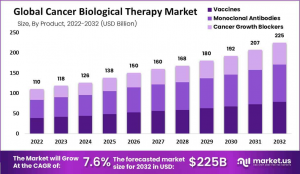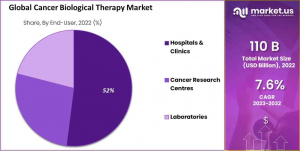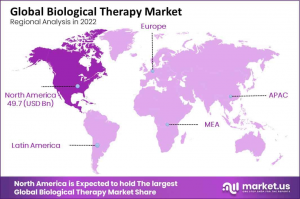Global Cancer Biological Therapy Market size is expected to be worth around USD 225 Billion by 2032 from USD 118 Billion in 2023, growing at a CAGR of 7.6%
The monoclonal antibodies segment is anticipated to dominate the cancer biological therapy market and hold the largest market share”
NEW YORK, NY, UNITED STATES, February 3, 2025 /EINPresswire.com/ -- Report Overview— Tajammul Pangarkar
Global Cancer Biological Therapy Market size is expected to be worth around USD 225 Billion by 2032 from USD 118 Billion in 2023, growing at a CAGR of 7.6% during the forecast period from 2023 to 2032.
Cancer biological therapy, also known as immunotherapy or biologic therapy, is an innovative treatment approach that utilizes the body's immune system to fight cancer. This therapy involves the use of substances made from living organisms or their products, such as antibodies, cytokines, or vaccines, to target and destroy cancer cells more effectively.
The growing use of biological therapy has revolutionized cancer treatment, offering new hope for patients with various cancers, including melanoma, lung cancer, and leukemia. Unlike traditional therapies like chemotherapy and radiation, which often affect both cancerous and healthy cells, biological therapies specifically target cancer cells, minimizing damage to surrounding tissues.
One of the key advancements in cancer biological therapy is the development of immune checkpoint inhibitors. These drugs work by blocking proteins that prevent immune cells from attacking cancer cells. Monoclonal antibodies, another major component of biological therapy, are engineered to recognize and bind to cancer cells, marking them for destruction by the immune system.
With continued advancements in cancer research and clinical trials, biological therapies are becoming an integral part of treatment regimens, improving survival rates and quality of life for cancer patients. The success of these therapies has spurred further exploration into their potential, paving the way for more personalized and effective cancer treatments in the future.
This annual report offers a comprehensive analysis of the global Cancer Biological Therapy market, providing valuable insights into future developments. By evaluating the historical and current dynamics of the Cancer Biological Therapy industry, the report includes a detailed forecast to inform key stakeholders. The Cancer Biological Therapy market report is designed to assist businesses in identifying and capitalizing on opportunities, while understanding key drivers, restraints, risks, and emerging trends. It also explores how time-sensitive factors impact the market under varying assumptions.
Unlock Competitive Advantages With Our PDF Sample Report https://market.us/report/cancer-biological-therapy-market/request-sample/
Key Takeaways
1. Biological Therapies Defined: Biological therapies, including immunotherapy and targeted therapy, utilize substances from living organisms to target cancer cells directly or enhance the immune system’s ability to combat cancer.
2. Expanding Treatment Options: The biological therapy market is rapidly expanding, driven by the introduction of innovative treatments that offer new solutions for cancers that are difficult to treat with conventional methods.
3. Immunotherapy Advancements: Immunotherapy has significantly advanced cancer treatment by boosting the immune system's ability to detect and attack cancer cells, providing new treatment possibilities for patients.
4. Targeted Therapies: Targeted therapies focus on blocking specific molecules involved in cancer growth, becoming a preferred treatment option for various cancers due to their effectiveness and reduced side effects compared to traditional chemotherapy.
5. Personalized Treatment Approach: Biological therapies often adopt a personalized treatment approach, tailored to a patient’s specific cancer type and genetic profile, ensuring more precise and effective care.
Scope of the Report:
The global Cancer Biological Therapyindustry report provides insights into production, consumption, and revenue data across various regions. This research report offers a comprehensive market evaluation, covering future trends, growth drivers, key insights, and verified industry data. It also highlights market share and growth rates across major regions.
Key market players and manufacturers are included in the report, offering a detailed analysis of industry trends and strategic developments. The findings enhance market understanding, enabling informed decisions related to geographical expansion, capacity growth, and new opportunities. The primary market drivers focus on global business expansion. Additionally, the report presents trends, advancements, material insights, technological developments, and the evolving market structure.
Key Highlights of the Cancer Biological Therapy Market Study
The insights presented in this report offer critical statistical data and key figures, enabling stakeholders to evaluate market trends, strategize effectively, and enhance their competitive ranking. Researchers have conducted a thorough Strengths, Weaknesses, Opportunities, Threats (SWOT) analysis, along with identifying major challenges to provide a comprehensive market assessment. Additionally, experts have utilized PESTEL analysis and Porter’s Five Forces framework to examine external market influences. By combining quantitative and qualitative research approaches, this study provides a deeper understanding of the Cancer Biological Therapy market, helping businesses establish a strong market presence.
Market Segments:
By Product
•Vaccines
•Monoclonal Antibodies
•Cancer Growth Blockers
By Route of Administration
•Oral
•Injectable
By End-User
•Hospitals & Clinics
•Cancer Research Centres
•Laboratories
By Distribution Channel
•Specialized Cancer Treatment Centers
•Hospital Pharmacies
•Retail Pharmacies
Buy This Premium Research Report@ https://market.us/purchase-report/?report_id=66398
Market Dynamics
Drivers: The cancer biological therapy market is propelled by several key factors. Advancements in molecular biology have facilitated the development of targeted therapies, enhancing treatment efficacy and patient outcomes. Additionally, the growing emphasis on personalized medicine, tailoring treatments to individual genetic profiles, has spurred the adoption of innovative therapies.
Government initiatives and funding for cancer research have further accelerated the development and approval of new cancer biological therapies. For instance, the National Cancer Institute (NCI) in the United States has been instrumental in supporting research that leads to the development of novel cancer therapies.
Trends: A significant trend in the cancer biological therapy market is the shift towards targeted therapies and immunotherapies. These treatments focus on specific molecular targets and the body's immune system to combat cancer cells more effectively.
The approval of immune checkpoint inhibitors, such as nivolumab, has marked a milestone in treating various cancers. Additionally, the integration of nanotechnology in drug delivery systems is gaining traction, aiming to improve the precision and effectiveness of treatments. The National Institutes of Health (NIH) has highlighted the potential of nanomedicine in enhancing cancer treatment outcomes.
Restraints: Despite advancements, the cancer biological therapy market faces several challenges. The high cost of novel therapies, including targeted treatments and immunotherapies, can limit accessibility for patients and strain healthcare systems. Moreover, the complexity of cancer's molecular biology presents difficulties in developing universally effective treatments.
The lack of effective early detection methods often leads to late-stage diagnoses, complicating treatment efforts. Additionally, the development of drug resistance and the occurrence of adverse side effects can hinder the long-term effectiveness of certain therapies.
Opportunities: The cancer biological therapy market presents several opportunities for growth and improvement. Ongoing research into the genetic and molecular underpinnings of cancer offers the potential for developing more effective and personalized treatment options. Collaborations between academic institutions, government agencies, and pharmaceutical companies can accelerate the discovery and development of new therapies.
Expanding clinical trials to include diverse patient populations can enhance the generalizability of treatment outcomes. Furthermore, the integration of artificial intelligence and machine learning in drug discovery processes holds promise for identifying novel therapeutic targets and expediting the development of effective cancer biological therapies.
Key Objectives Of The Cancer Biological Therapy Global Market:
• To analyze the global Cancer Biological Therapy market consumption, industry size estimation, and forecast.
• To understand the general trends of the global Cancer Biological Therapy market by understanding its segments and sub-segments.
• Focuses on the leading manufacturers of the Global Cancer Biological Therapy market to analyze, describe and develop the company's share, revenue, market value, and competitive landscape of the company over the years.
• To analyze the Cancer Biological Therapy market in terms of upcoming prospects, various growth trends, and their contribution to the international market.
• To analyze the production/consumption analysis of the global Cancer Biological Therapy market with respect to key regions.
• To get detailed statistics about the key factors governing the growth potential of the global Cancer Biological Therapy market.
Key Market Players:
•Merck & Co., Inc.
•Hoffmann-La Roche Ltd
•Novartis AG
•Amgen Inc.
•Bristol-Myers Squibb Company
•Celgene
•Eli Lilly and Company (US)
•EnGeneIC
•Pfizer
•Intas Pharmaceuticals Ltd.
•Astellas
•Otsuka
•Teva Pharmaceutical Industries Ltd.
•Bayer AG
•GlaxoSmithKline PLC
•AbbVie Inc.
•Astellas Pharma Inc.
•Seattle Genetics
•Takeda Pharmaceuticals
•Spectrum Pharmaceuticals
•Bausch Health Companies Inc.
•Johnson & Johnson Services, Inc.
•AstraZeneca PLC
•Other Key Players
Regional Analysis:
• North America (Panama, Mexico, Barbados, United States, Canada, Puerto Rico, Trinidad, and Tobago, etc).
• South and Central America (Brazil, Chile, Argentina, Belize, Costa Rica, Panama, Guatemala, El Salvador).
• Europe (Spain, Belgium, France, Holland, Germany, Sweden, Switzerland, San Marino, Ireland, Norway, Luxembourg, etc).
• Asia-Pacific (Qatar, China, India, Hong Kong, Korea, Israel, Australia, Singapore, Japan, Kuwait, Brunei, etc.).
• The Middle East and Africa (United Arab Emirates, Egypt, Algeria, Nigeria, South Africa, Angola, Saudi Arabia, Bahrain, Oman, Turkey, Lebanon, etc.).
Key questions answered in the report include:
• What are the key factors driving the Cancer Biological Therapy market?
• What was the size of the Emerging Cancer Biological Therapy Market in 2024?
• What will be the size of the Emerging Cancer Biological Therapy Market in 2033?
• Which region is projected to hold the highest market share in the Cancer Biological Therapy market?
• What is the market size and forecast of the global Cancer Biological Therapy market?
• What products/segments/applications/areas will be invested in the Global Cancer Biological Therapys Market during the forecast period?
• What are the technological trends and regulatory framework of the Global Cancer Biological Therapy market?
• What is the market share of the key vendors in the global Cancer Biological Therapy market?
• What are the right modes and strategic moves to enter the Global Cancer Biological Therapy Market?
Reasons to Acquire This Report
- Provides a comprehensive industry outlook, covering global market trends and high-growth segments.
- Includes market share analysis of leading players, company profiles, and critical industry insights.
- Identifies emerging trends, high-growth regions, and market drivers, restraints, and opportunities.
- Examines the latest technological advancements and innovations across various industries.
- Estimates current market size and future growth potential across key applications and industries.
Lawrence John
Prudour
+91 91308 55334
email us here
Legal Disclaimer:
EIN Presswire provides this news content "as is" without warranty of any kind. We do not accept any responsibility or liability for the accuracy, content, images, videos, licenses, completeness, legality, or reliability of the information contained in this article. If you have any complaints or copyright issues related to this article, kindly contact the author above.




